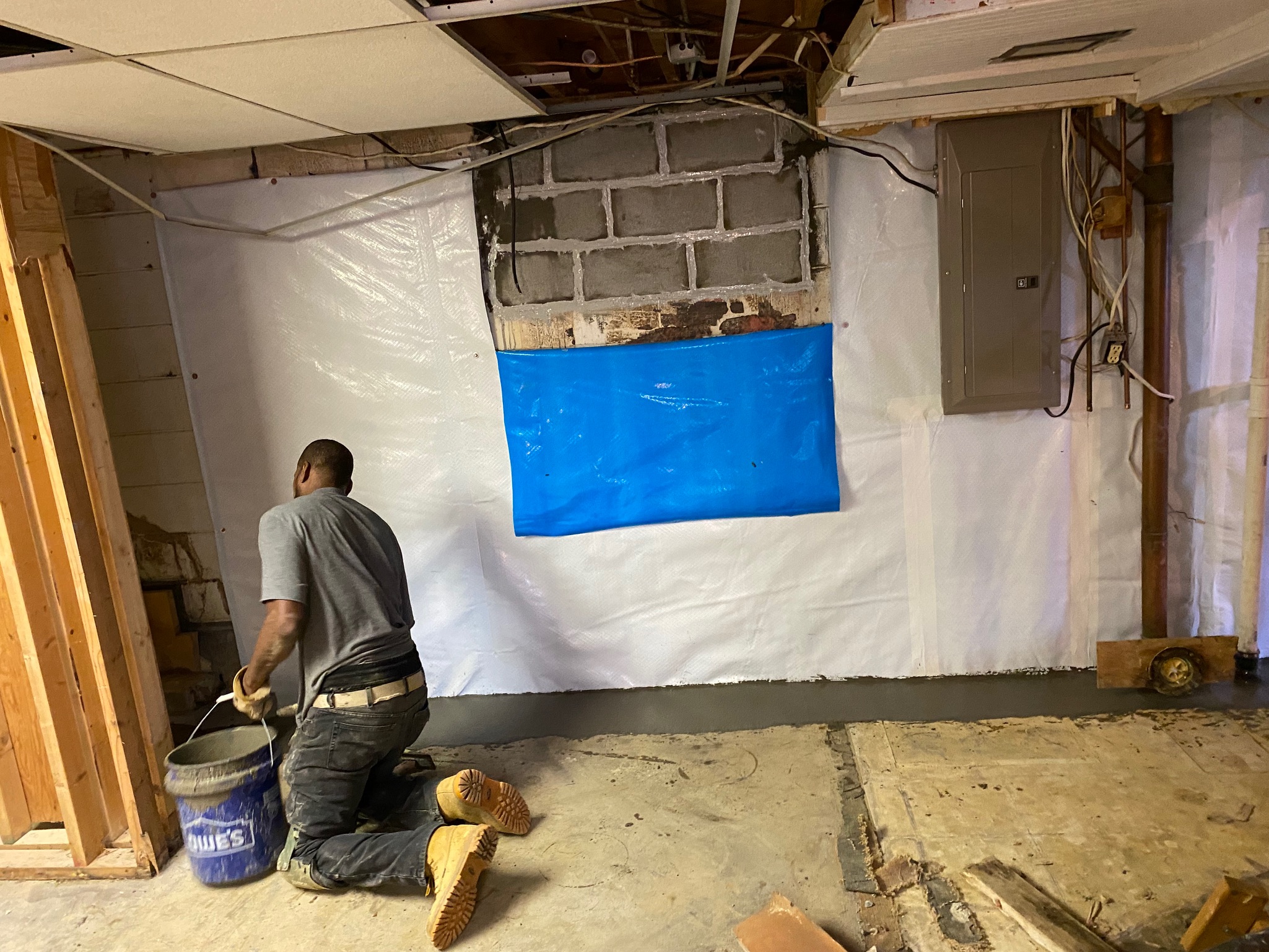
As you ponder about the various aspects of your new construction project, have you considered the importance of waterproofing? Sure, you might be thinking about the initial costs, but consider this: waterproofing provides a shield against potential water damage, mold growth, and even structural decay. It’s not just about avoiding the hassle of dealing with dampness in your new home; it’s about safeguarding the longevity of your property, boosting air quality, and possibly even elevating your home’s market value. So, wouldn’t you agree that these long-term benefits might make the initial investment worthwhile?
Key Takeaways
- Waterproofing provides crucial protection against water damage, preserving the structural integrity of new homes.
- It can prevent health risks associated with mold by controlling moisture, improving indoor air quality.
- Waterproofing may increase property value, making homes more marketable and potentially lowering insurance premiums.
- Despite initial costs for materials and installation, waterproofing can result in long-term savings by averting costly repairs.
- The effectiveness of waterproofing, despite potential challenges and upkeep, outweighs its costs, offering peace of mind for homeowners.
Understanding Home Waterproofing
Waterproofing your home isn’t just a precaution; it’s a necessity. It’s a key step in new home construction that you can’t afford to ignore. When you’re building a new house, the choice of waterproofing materials is vital. It’s your first line of defense against water damage, and you need something reliable, durable, and effective.
There are plenty of waterproofing materials available in the market today, each with its own set of benefits. You’ve got sealants, membranes, cementitious products, and more. It’s all about picking the right one for your specific needs. However, keep in mind that the effectiveness of these materials will greatly depend on proper application.
But waterproofing materials are just half the battle. You also need to take into account your drainage systems. Water can easily find its way into your home if it’s not properly directed away.
As a result, ensuring a well-planned and well-executed drainage system is equally important. Your gutters, downspouts, and drains should all be working together to keep water at bay.
Benefits of Waterproofing New Homes
With a solid understanding of home waterproofing, you may be wondering why all this effort is worth it. To put it simply, the benefits are numerous.
One major advantage is mold prevention. By controlling moisture, you’re taking a considerable step in preventing mold growth. This isn’t just about aesthetics; it’s also about health. Exposure to mold can lead to a range of health issues, from allergies to more serious conditions.
Waterproofing also provides foundation protection. A waterproof home is a sturdy home, preventing damage from water seepage that can compromise your foundation over time. This guarantees your property’s longevity and maintains its value.
Speaking of property value, waterproofing can greatly enhance it. Potential buyers will appreciate the extra effort you’ve put into protecting the home. This could translate to a higher resale value in the future.
The benefits don’t stop there. Waterproofing can result in insurance savings, as insurers may offer lower premiums for homes less prone to water damage.
Plus, a waterproof home is typically more energy-efficient. You’ll save on heating and cooling costs, as moisture can affect your home’s insulation.
Potential Drawbacks to Consider
So, are there any potential drawbacks to waterproofing your new construction home? Well, like most things in life, it’s not all rainbows and butterflies. Despite the undeniable benefits, there are some considerations you should be aware of.
First off, installation challenges. Waterproofing your home isn’t exactly a DIY project. You’ll need professionals to guarantee the job is done correctly and, let’s be honest, that can sometimes be a headache.
Finding reliable contractors, scheduling, and dealing with potential delays are all potential pitfalls. And, if not done properly, ineffective waterproofing can lead to costly damage down the line.
Then there’s material considerations. Waterproofing materials aren’t one-size-fits-all. Different materials come with different price tags, life spans, and effectiveness levels.
You’ll need to do your homework to decide which option is best for your home and budget. Incorrect material choice can lead to subpar performance and additional expenses.
Waterproofing Methods for Homes
When it comes to safeguarding your home against water damage, various methods are at your disposal.
First, you can opt for interior waterproofing, which includes drainage systems and sump pumps. These systems collect water that seeps into your basement and pump it out, preventing damage.
Exterior waterproofing is another option, which involves foundation sealing and membrane applications. Foundation sealing protects your home’s base from water penetration, while membrane applications create a barrier on your home’s exterior preventing water from seeping in.
Then there’s landscape grading, a method that involves sloping the land around your house to divert water away from the foundation. It’s a simple yet effective way of preventing water from pooling around your home.
Lastly, you’ve got the vapor barriers. These are installed in your home’s walls, ceiling, or floor to prevent moisture from seeping in. They’re particularly useful in humid climates where condensation can be a big issue.
Cost Analysis of Home Waterproofing
Let’s now turn your attention to the financial side of home waterproofing.
You might be curious about the breakdown of expenses and how this will impact your wallet in the long run.
We’ll cover both of these aspects to give you a thorough understanding of the costs involved.
Waterproofing Expense Breakdown
Understanding the financial implications of waterproofing your new construction home is essential. When considering the costs, you’ll need to factor in two key elements: foundation sealing and drainage solutions.
Foundation sealing is the first line of defense against water infiltration. This process typically involves the application of a waterproofing membrane to the exterior of your home’s foundation. Depending on the product used and the size of your home, foundation sealing can range from $2,000 to $6,000.
The second vital aspect of waterproofing is implementing effective drainage solutions. This could mean installing French drains, sump pumps, or exterior drainage systems. Again, depending on your specific needs and the size of your property, you could be looking at an expense of $1,000 to $4,000 for this component of your waterproofing project.
Keep in mind these are just the direct costs. There are also indirect costs like potential landscape repair or replacement costs.
It’s important to get a thorough quote from a reputable waterproofing company to understand all the costs involved.
Long-term Financial Implications
Explore the long-term financial implications of home waterproofing, and you’ll realize that it’s an investment with substantial returns. While there’s an upfront cost to evaluate, the investment longevity of waterproofing your home is worth every penny.
Think about it. Waterproofing prevents structural damage from water seepage, mold, and mildew. Over time, you’ll be saving on expensive repairs that can run into thousands of dollars. This saving, when compared to the initial cost of waterproofing, gives you a clear picture of the financial benefit in the long run.
Furthermore, waterproofing increases your property value. Prospective buyers look for homes that are well-maintained and free from potential issues like water damage. A waterproofed home definitely ticks this box.
Besides, it’s a selling point that helps you command a higher price, recouping your waterproofing investment and then some.
Making an Informed Decision on Waterproofing
As you consider waterproofing for your new home, it’s important to understand the basics.
Knowing the benefits will help you see the value beyond the costs. It’s not just about spending money, but making a savvy investment in your property’s long-term durability and value.
Understanding Waterproofing Basics
Countless homeowners are faced with the essential decision of selecting the right waterproofing method for their new construction homes. Understanding the basics of waterproofing is significant to making this decision.
Waterproofing involves creating a barrier around your home’s structure to prevent water from penetrating. This is fundamental because water can cause a lot of damage, leading to costly repairs down the line.
Two key components of this process are foundation drainage and moisture barriers.
Foundation drainage is the system that directs water away from your home’s foundation. Without proper drainage, water can pool around your foundation and find its way into your home. It’s not something you’ll want to overlook.
Moisture barriers, on the other hand, are materials designed to resist water. They’re used to cover surfaces that could potentially come in contact with water, like your basement walls or the foundation.
It’s important to select a moisture barrier that’s durable and suitable for your home’s specific needs.
Knowing these basics, you’re now better equipped to make an informed decision about the right waterproofing method for your home.
Benefits of Waterproofing
Having grasped the basics of waterproofing, you might be wondering about the tangible benefits it offers. Well, one of the primary advantages of waterproofing is mold prevention. By sealing out moisture, you’re creating an environment where mold simply can’t thrive. This isn’t just a boon for your home’s aesthetics—it’s also a major health benefit. Mold spores can cause allergic reactions, respiratory issues, and other health problems.
Waterproofing also provides critical foundation protection. Over time, water can cause significant structural damage to your home, including the foundation. By waterproofing, you’re creating a barrier that prevents water from seeping into your foundation, protecting it from potential cracks, leaks, and even collapse. It’s about safeguarding your investment and ensuring the longevity of your property.
Moreover, waterproofing can increase your home’s value. Future buyers will appreciate the peace of mind that comes with knowing the home is protected against water damage and mold.
In short, waterproofing isn’t just about avoiding a mess—it’s about ensuring your home’s structural integrity, maintaining its value, and promoting a healthier living environment.
Waterproofing: Costs Vs. Value
While you might be initially put off by the upfront costs of waterproofing, it’s crucial to contemplate the long-term value this investment brings.
Yes, waterproofing materials and installation techniques do represent an additional cost. However, considering the potential damage that water can do to a structure, it’s a wise investment.
You’re not just paying for materials and labor; you’re investing in peace of mind.
Think about the value of knowing your home is protected against water damage, mold, and structural instability. It’s not just about immediate, tangible savings but also about preventing future costly repairs.
Moreover, waterproofing your new home can increase its resale value.
Buyers are willing to pay more for a house that’s been properly waterproofed. It’s a selling point that can differentiate your property in a crowded market.
Frequently Asked Questions
Can Waterproofing Extend the Lifespan of My Homes Structure?
Absolutely, waterproofing can greatly extend your home’s structural integrity.
It acts as a barrier against moisture, which is a leading cause of structural damage. By controlling moisture, you’re preventing the potential deterioration of your home’s foundation and walls.
So, not only does it prolong your property’s lifespan, but it also saves you costly repairs in the future.
It’s a smart investment that’ll pay off in the long run.
Does Waterproofing Have Any Impact on the Homes Resale Value?
Absolutely, waterproofing can greatly impact your home’s resale value.
It’s all about resale market dynamics. Buyers often seek homes with preventive measures like waterproofing, as it assures them of the property’s longevity.
Waterproofing benefits such as preventing structural damage and mold growth can be appealing selling points.
What Are the Signs That a Home Needs Waterproofing?
You’ll know your home needs waterproofing when there are clear signs of moisture detection.
Look out for damp spots, mold growth, or a musty odor in your home. Don’t ignore peeling paint, warped floors, or condensation on windows. These are signs of excessive moisture.
Also, check your foundation integrity. Cracks or bulges in the foundation walls may indicate water damage.
It’s important to address these issues promptly to prevent more serious problems.
Can I Apply Waterproofing Measures to an Existing Home?
Absolutely, you can apply waterproofing techniques to your existing home.
It’s not just for new builds. Various solutions are available to suit different needs.
You might opt for interior or exterior waterproofing, depending on your situation.
It’s a worthwhile investment that can prevent future damage, save you money in the long run, and create a healthier living environment.
Is There a Specific Time of Year Best Suited for Applying Waterproofing Measures?
Absolutely, seasonal considerations play a significant role in applying waterproofing measures.
Ideally, you’d want to do it during dry, warm months. Cold or damp conditions can affect the effectiveness of the waterproofing material, causing it not to adhere properly.
So, aim for late spring or summer when weather’s most predictable.
It’s not just about the application process though. Proper curing also needs dry, mild conditions.
Conclusion
So, is waterproofing worth it for new homes? Absolutely. While upfront costs may make you hesitate, consider the long-term savings and peace of mind that comes with it. You’re not just preventing potential water damage and mold growth, you’re also increasing your home’s lifespan and value. It’s a smart move for any new construction. In the end, the decision is yours, but make sure it’s an informed one.

Seal-tite Basement Waterproofing Co. is a full service basement environment contractor. We carry an A+ Better Business Bureau rating. We repaired over 40,000 homes and structures in Virginia, West Virginia, Tennessee, and North Carolina. We are fully insured and licensed. We have worked in all types of locations, including residential and commercial locations, government agencies, colleges, hospitals, churches, and condo associations.
Seal-tite® offers a lifetime transferable warranty. We carry a Class A Contractor’s License and we are fully insured. Our satisfied customers range from government agencies to businesses, hospitals, colleges, churches, and thousands of homeowners. Your home is probably the single largest investment you will make in your lifetime. Don’t wait, call Seal-tite® to help make your home dry, safe and livable.

